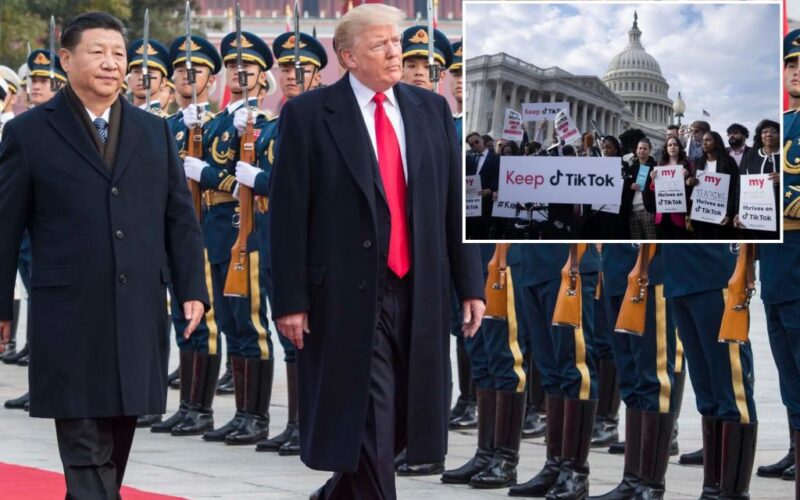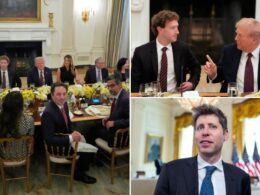The US and China are closing in on a deal to avoid a US ban of TikTok – and it will include China allowing US techies to replicate and replace the wildly popular app’s secret-sauce recommendation algorithm, On The Money has learned.
Top White House officials confirmed on Monday they’ve settled on a “framework” for an agreement to finally resolve the yearslong dispute over whether TikTok can and should be allowed to operate in the US – with critics raising concerns about everything from national security to teens’ mental health.
Just days before TikTok is set to be banned, a deal is now taking shape that would sell a controlling stake in the controversial app to US investors, which the White House believes satisfies a congressional law last year that bans the controversial app unless it separates itself from Beijing.
Sources say the situation remains fluid and details, including how the all-important algorithm is handled in the US company, could change.
The deal sets the stage for the creation of a new US company worth as much as $50 billion that would serve 172 million US users. Majority owners of the new firm will include billionaire Jeff Yass of Susquehanna International — a major backer of President Trump — and Bill Ford of General Atlantic Partners. A host of smaller investors are vying for equity slices, sources said.
“Everyone and their dog wants a piece of this thing now that it looks like it will have the full blessing of Trump, Congress and the Chinese,” one potential investor told On The Money.
ByteDance, the Chinese outfit that created TikTok, will maintain a 19.9% interest in the new company. It will continue to maintain full ownership of TikTok’s other operations that boasts more than a billion monthly active users and has a market value of close to $300 billion even without the US unit.
While Oracle co-founder Larry Ellison will play a major role in housing the new US company in the tech giant’s “cloud,” it’s unclear whether he can take an equity stake while Oracle rents that space to TikTok. That’s why there’s talk that his son, Skydance founder David Ellison – fresh off his $8 billion purchase of Paramount and looking to complete a $50 billion deal to buy Warner Bros Discovery – could instead take the TikTok stake, sources said.
The ownership of the algorithm – which has kept millions glued to the app as it churns out a relentless, addictive stream of short-form videos – has been a key sticking point in the negotiations in broader US-China trade talks.
US law prohibits the Chinese owned TikTok from operating in the US over espionage fears. But President Trump, a former TikTok critic, has issued a series of executive orders delaying the ban because he believes the platform helped him win the 2024 election by converting its young-leaning user base into MAGA voters.
“The big Trade Meeting in Europe between The United States of America, and China, has gone VERY WELL! It will be concluding shortly,” Trump wrote Monday in a post on Truth Social.
“A deal was also reached on a ‘certain’ company that young people in our Country very much wanted to save. They will be very happy!”
As reported Sunday by this reporter, Trump will issue another extension so that final details of the new TikTok arrangement can be worked out between US and Chinese negotiators led by Treasury Secretary Scott Bessent, and one-on-one between President Trump and Chinese President Xi Jinping.
People close to the deal say Trump may have to extend TikTok’s life more than the usual 90 days given the complexity of creating a new algorithm.
A White House spokesman and a spokeswoman for Bessent had no immediate comment.
Chinese president Xi at first refused to relinquish any control over the app, but agreed to the compromise seeking to end the trade stalemate with the US and pave the way for Trump to visit Beijing. Trump will be speaking with Xi this Friday to confirm the framework’s details.
Some China hawks in the GOP continue to worry that TikTok’s algorithm enables the CCP surveillance state and fills users’ screens with anti-US propaganda. TikTok’s largest demographic group is between 18 and 24 years old, with a significant number under the age of 18 hooked on the app.
Administration officials believe the new structure will meet the very high bar set by bi-partisan legislation that was deemed constitutional by the US Supreme Court. The law states that the Chinese must have no control over TikTok for it to remain operational in the US. By recreating the algo, the new company would meet that requirement.
The latest extension was set to expire Wednesday and Trump had privately threatened to let the app go dark to gain leverage in the broader trade talks, until news broke late Sunday that a “framework” had been reached to keep TikTok operating.
That framework, according to investors briefed on the matter, hinges on a compromise: The new US investor group won’t directly own the original algo, but it can replicate it, divorce it from Chinese control and then use what’s essentially a US created app.








